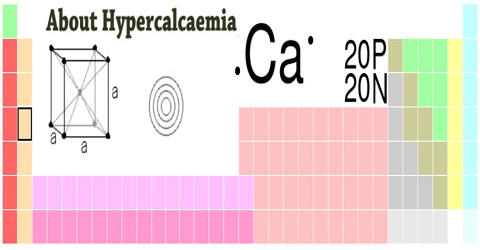About Hypercalcaemia
Definition
Hypercalcaemia is a condition in which the calcium level in our blood is above normal. About 10% to 20% of people with cancer develop hypercalcaemia. It can be life threatening.
Hypercalcaemia most commonly results from overactive parathyroid glands. These four tiny glands are each about the size of a grain of rice and are located on or near the thyroid gland. Other causes of hypercalcaemia include cancer, certain other medical disorders, some medications, and excessive use of calcium and vitamin D supplements.
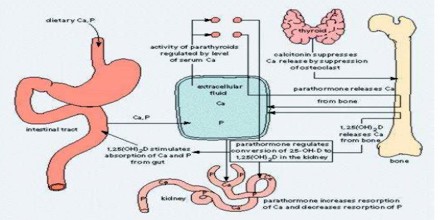
However, in hypercalcaemia, just over half the circulating calcium is protein bound and therefore the level of circulating protein, principally albumin, must also be taken into consideration in making this measurement. The level for serum calcium is frequently given by laboratories as both an uncorrected level and a corrected level which has allowed for changes in albumin levels. It is only the ionised (unbound) calcium which is physiologically important, taking part in cellular activities such as neuromuscular contraction, coagulation and other cellular activities.
It can cause a number of nonspecific symptoms, including loss of appetite, nausea, thirst, fatigue, muscle weakness, restlessness, and confusion. An elevated level of calcium may cause muscle weakness and constipation, affect the conduction of electrical impulses in the heart (heart block), lead to calcium stones (nephrocalcinosis) in the urinary tract, impair kidney function, and interfere with the absorption of iron, predisposing the person to iron deficiency.
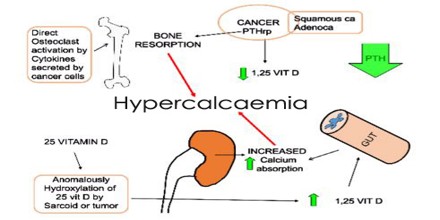
Causes and Symptom of Hypercalcaemia
Our body regulates the calcium level in our blood through the parathyroid hormone (PTH), and another hormone called calcitonin. Normally, PTH increases when the calcium level in your blood falls and decreases when our calcium level rises. Our body also makes calcitonin when our calcium level gets too high. When we have hypercalcemia, our body can’t regulate our calcium level as it normally would. There are several possible causes of this condition. It can be the result of all four parathyroid glands producing too much PTH (parathyroid hyperplasia), or one gland specifically producing an excessive amount of hormone, usually the result of a parathyroid adenoma, or benign tumor.
The symptoms of hypercalcaemia often develop slowly and may be similar to the symptoms of cancer or cancer treatment. How serious a person’s symptoms are is not related to the calcium level in the blood. Many patients have no symptoms. And, older patients usually experience more symptoms than younger patients.
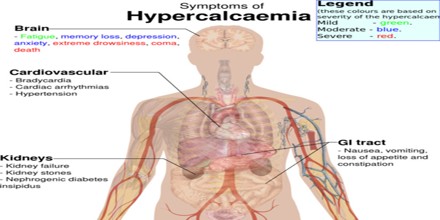
People with hypercalcaemia may experience the following symptoms:
- Loss of appetite
- Nausea and vomiting
- Constipation and abdominal pain
- Increased thirst and frequent urination
- Fatigue, weakness, and muscle pain
- Confusion, disorientation, and difficulty thinking
- Headaches
- Depressio
Symptoms of severe hypercalcemia may include:
- Kidney stones, a painful condition in which salt and minerals form solid masses called “stones” in the kidneys or urinary tract
- Irregular heartbeat
- Heart attack
- Loss of consciousness
- Coma
More-severe cases produce symptoms related to the parts of our body affected by the high calcium levels in our blood.
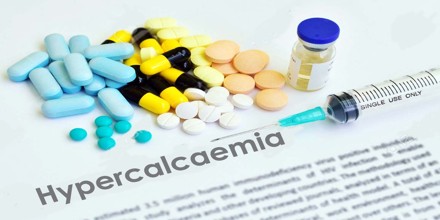
Treatment of Hypercalcemia
If anyone has mild hypercalcaemia, doctor might suggest simply keeping track of their condition and waiting to see if it improves or gets worse on its own.
Patient might need hospital treatment if they have a severe case. The goal of treatment is to return their calcium level to normal. Treatment also aims to prevent damage to their bones and kidneys. Treatment options include the following:
- Calcitonin is a hormone produced in the thyroid gland. It slows down bone loss.
- Intravenous fluids keep you hydrated.
- Corticosteroids are anti-inflammatory medications. They help your body handle having too much vitamin D.
- Loop diuretic medications can help your kidneys function and get rid of extra calcium.
- Intravenous bisphosphonates can keep your bones from breaking down.
- Dialysis can be given to rid your blood of extra calcium and waste when you have damaged kidneys. This is only done if other treatment methods aren’t working.
If hypercalcaemia is seen in the presence of cancer, the average 30-day survival rate is about 50%. The prognosis is excellent for many of the other causes of hypercalcaemia provided the underlying cause is addressed and treated.
